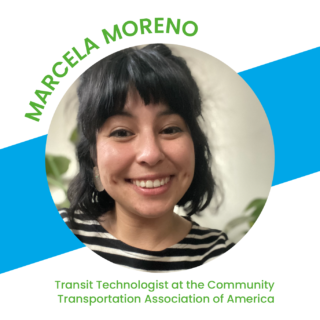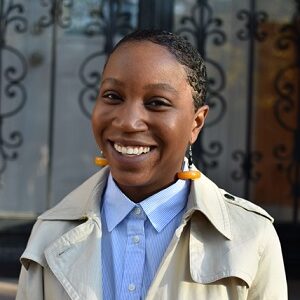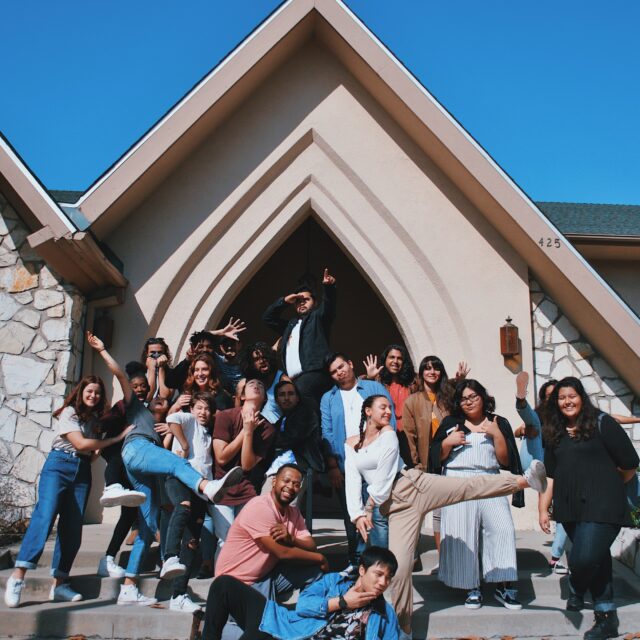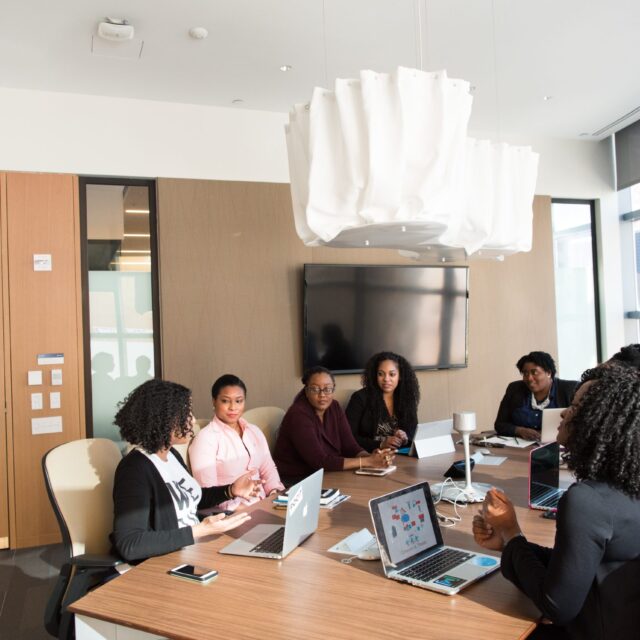Introducing Our 2021 Transportation Justice Fellows
by Kiran Herbert, Communications Manager
March 26, 2021
Meet 12 individuals from across the country, all of whom are doing the heavy work of promoting equity in transportation.
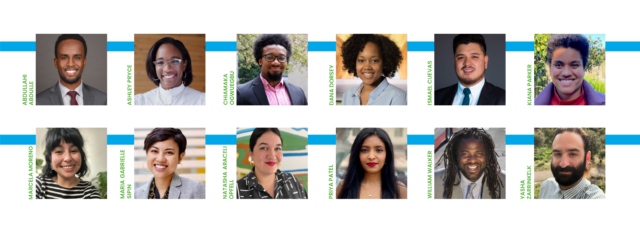
Introducing our 2021 Transportation Justice Fellowship cohort.
Since 2019, the Better Bike Share Partnership team and NACTO have been hard at work developing a one-of-a-kind Transportation Justice Fellowship. Designed based on the research of Dr. Destiny Thomas, CEO and founder of Thrivance Group, this nine-month fellowship will meaningfully invest resources to support and sustain 12 Black, Indigenous and People of Color (BIPOC) committed to advancing equity in the transportation field.
Throughout the course of the year, fellows will receive more than 60 hours of training to develop individual and institutional capacities for creating a more just and representative mobility field. Through events, one-on-one coaching, check-ins, and structured collaboration, fellows will receive deep support as they advance professionally and work on tangible ways to improve mobility for communities of color. Thrivance Group and Dr. Destiny Thomas will work alongside NACTO program manager Nicole Payne to oversee the cohort.
“We hope to use our large organizational network and resources to support the personal and professional development of our fellows through coaching, mentorship and training, ” says Payne. “As well as to elevate their own profile by connecting them with speaking engagements and other opportunities to expand their expertise.”
We narrowed down more than 90 applications to a final group, whose backgrounds and skillsets reflect communities with the greatest mobility needs in the U.S. Our fellows work in all sectors of transportation, from government to nonprofits, public health to the private sector. Not only do they come from all regions of the U.S., but each brings with them a distinct biography and set of hard and soft skills to share with the group. Our hope is that by creating community, our fellows will be better able to tackle some of the toughest transportation challenges facing our country today.
Our 2021 Transportation Justice Fellows:
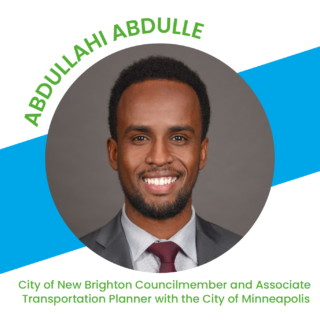
Abdullahi Abdulle
He/Him/His
New Brighton, Minnesota
In your opinion, what’s the biggest issue facing transportation/mobility right now?
The misalignment and disconnection between recipients of services—especially BIPOC and non-English speakers—and public/private service providers. This can be explained by decision-makers lacking the lived experiences and personal connection to the issues they attempt to address.
Marcela Moren
She/Her/Ella
Asheville, North Carolina (soon to be Washington, D.C. in July!)
What’s got you feeling hopeful about the future of transportation/mobility?
I think that the pandemic has really demonstrated the importance of public transportation, whether it’s getting essential workers to their jobs, people to their medical appointments, or even assisting health departments with vaccine distribution. And not just transit but also micromobility, sidewalks, greenways, you name it! I am extremely hopeful that this narrative can help make the case that when public transportation infrastructure is properly supported, everybody in the community wins while also investing in communities that historically have not been.
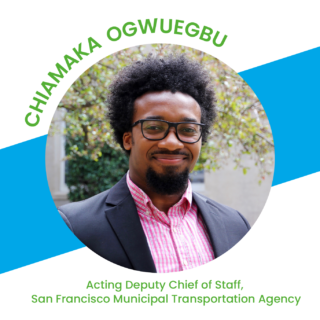
Chiamaka Ogwuegbu
He/Him/His
Oakland, California
In your opinion, what’s the biggest issue facing transportation/mobility right now?
Creating alignment across and within levels of government on a core desired outcome of meeting folks’ self-described mobility needs in a way that centers marginalized people and our health.
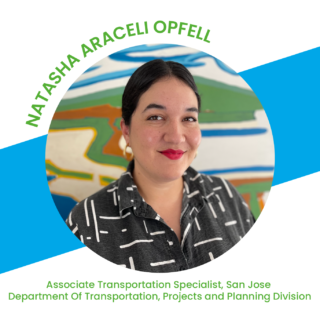
Natasha Araceli Opfell
She/Her/Ella
San Francisco Bay Area, California
In your opinion, what’s the biggest issue facing transportation/mobility right now?
Cities are depending more and more on various neoliberal transportation solutions to try to solve transportation problems. This is creating an unsustainable transportation framework that prohibits the advancement of transportation programs and policies that will be of most benefit to under-resourced populations.
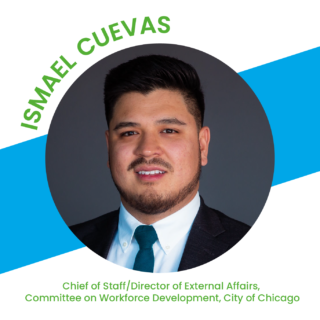
Ismael Cuevas
He/Him/His
Chicago, Illinois
In your opinion, what’s the biggest issue facing transportation/mobility right now?
Many cities across America have truck routes traversing high-density communities. Transportation and logistic companies are moving into the cities because they need next-day delivery to customers. This means that their trucks and cargo fleets need to co-exist on the same road as bicycles, e-scooters and pedestrians. It also means that many neighborhoods that will be home to these huge facilities probably aren’t pedestrian or micromobility-friendly. We need to create a transportation ecosystem that truly allows for the safe movement of people and offsets the carbon emissions we create.
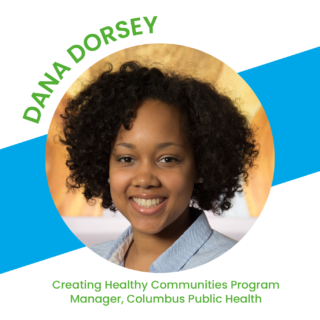
Dana Dorsey
She/Her/Hers
Columbus, Ohio
What drove you to apply for this fellowship?
I was driven to apply for this fellowship because I work in communities of color but many of my colleagues don’t look like me or the communities we serve. Although we are sincere in our drive for equity, I think we sometimes miss the mark on truly effective and inclusive engagement. I believed this fellowship would give me an opportunity to meet colleagues who are like me in more ways than one, with whom I can learn from, bond with and tackle challenges.
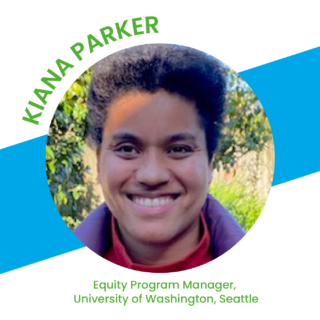
Kiana Parker
She/Her/Hers
Seattle, Washington
In your opinion, what’s the biggest issue facing transportation/mobility right now?
Coordinating public transportation with vaccination sites to ensure it reaches vulnerable communities and especially those who don’t own a car.
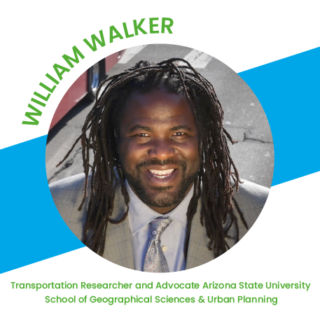
William Walker
Any pronoun: He, She or They
San Francisco, California
In your opinion, what’s the biggest issue facing transportation/mobility right now?
Mobility is most directly linked to convenience. A transportation system that only serves the user by getting them there quickly and efficiently is unsustainable. Understanding how to build walkable communities that allow working-class people of color the same rights to the city as the affluent is how we will make communities more equitable for all.
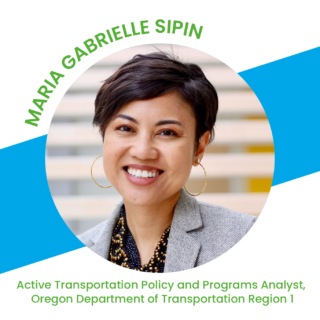
Maria Gabrielle Sipin
She or They
Portland, Oregon / Los Angeles, California
What drove you to apply for this fellowship?
Currently, decision-makers and large institutions are developing technical tools and grappling with defining measurable outcomes for transportation safety and climate change mitigation. I’d like to participate with others who may also be charged with addressing racial justice, atonement, and healing in a meaningful way when bureaucratic and systemic barriers exist.

Priya Patel
She/Her/Ella
Austin, Texas
What’s got you feeling hopeful about the future of transportation/mobility?
Since streets are the only continuous open area available in modern cities, we should consider the feasibility of converting them as an alternative open space. Humanizing the repetitive and mundane car-centric street designs will go a long way in encouraging social interactions and creating distinct and inviting spaces that people can choose to experience.
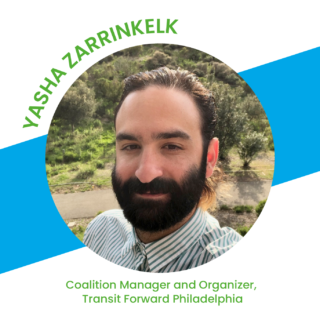
Yasha Zarrinkelk
He/Him/They/Them
Philadelphia, Pennsylvania
In your opinion, what’s the biggest issue facing transportation/mobility right now?
The safety and well-being of BIPOC bicyclists, pedestrians, drivers and transit riders. Whether it’s the disproportionate number of traffic deaths in BIPOC communities and how Black, Indigenous and Latinx people are more likely than white people to be struck and killed by a driver, or the murder and violent treatment of BIPOC bicyclists, pedestrians, drivers and transit users at the hands of police officers in the name of enforcement.
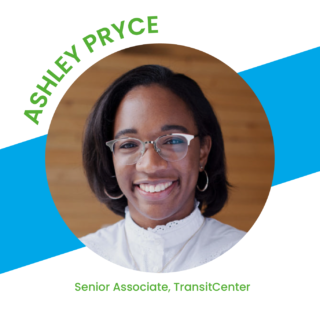
Ashley Pryce
She/Her/Hers
Brooklyn, New York
What’s got you feeling hopeful about the future of transportation/mobility?
I feel hopeful that more and more Black and brown folks, as well as folks who are committed to doing justice-centered work, are entering the field. They’re expanding notions of “who” works in this sector and what is possible in this work.
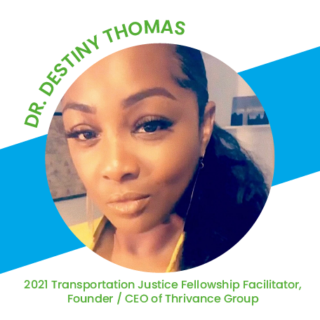
Dr. Destiny Thomas
She/Her/Hers
Los Angeles, California
Dr. Destiny Thomas is a change agent and an anthropologist planner. Known as the Unurbanist Planner, she is the founder and CEO of Thrivance Group, a multi-regional, socially responsible, for-profit firm that works to make public spaces and public services safer, healthier and more accessible, especially for Black, Indigenous, and transgender people, as well as those with disabilities. We’re thrilled to have her as our 2021 Transportation Justice Fellowship facilitator.
The Better Bike Share Partnership is funded by The JPB Foundation as a collaboration between the City of Philadelphia, the National Association of City Transportation Officials (NACTO) and the PeopleForBikes Foundation to build equitable and replicable bike share systems. Follow us on Facebook, Twitter and Instagram or sign up for our weekly newsletter. Got a question or a story idea? Email kiran@peopleforbikes.org.

